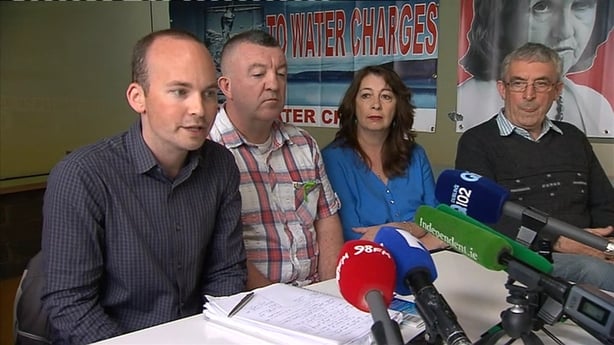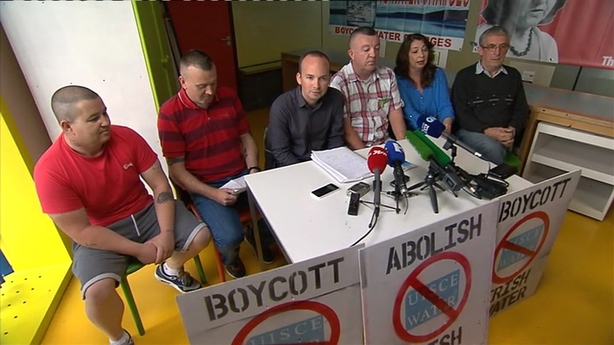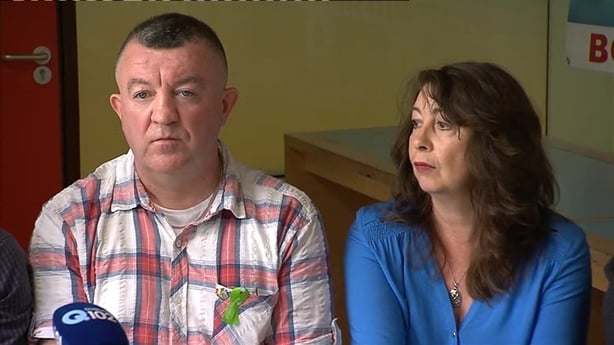A number of Jobstown residents who were among those arrested after last November's water charge protest in which Tánaiste Joan Burton was trapped in her car for two hours have expressed their fear that they may be facing charges.
They told a news conference in Jobstown this morning that they believed the sit down protest and slow march demonstration they took part in were peaceful.


Socialist Party and Anti Austerity Alliance TD Paul Murphy and five other people who were arrested following the protest last November attended the conference in Jobstown.
None of the six have been told whether or not they will face any criminal charges.
Carole Purcell said she had spoken to one of the students at An Cosán college in Jobstown who had told her that the students did not want Joan Burton to attend their graduation ceremony last November.
She said the students refused to shake the Tánaiste's hand, accept their certificates from her or have their picture taken with her.
However, Ms Purcell said Ms Burton had decided that she wanted to walk through the crowd.
Another protester, Frank Donaghy, said he believed gardaí and the DPP had questions to answer about how information in relation to potential charges had been made public.
Mr Murphy said he was concerned that protesters were facing charges for taking part in a peaceful sit-down and slow march demonstration.
He said in his opinion Ms Burton had not been trapped in her car on the day in question, that she had been able to leave her car, but that her car was delayed for about two hours by the protest.
Asked about his comments to protesters about allowing Ms Burton's car to leave, he said that had come from the gardaí asking him to engage with the crowd in an effort to bring the protest to an end.
He said a photograph published in today's Irish Independent newspaper which shows a man throwing a brick, was not taken during the anti-water charges demonstration at Jobstown last November.
Asked if he would do anything differently in relation to his actions on the day of the November protest, Mr Murphy said nobody had been in charge of the protest and it was not organised.
He said it was a protest spontaneously organised by people from the community.
He said he believed he had the right to participate in a peaceful sit-down and slow march protest.
Mr Murphy was asked about comments he made on RTÉ's Morning Ireland that Ms Burton was hated in Jobstown.
He said it was not personal, but there was a hatred of what she represented politically.
Ms Purcell said she did not hate anybody, but she did not like Ms Burton's austerity policies.

Ms Purcell and her husband Ken said they found out about the possible charges when they read it in the newspaper on Thursday, after it was reported by RTÉ the previous evening.
Mr Purcell's mother died last Sunday, and he said hearing the reports about the charges was the last thing he needed.
Ms Purcell said she was shocked that they had found out this way and they had no contact from gardaí.
Mr Purcell said he hoped gardaÍ would contact their solicitor so that they would know where they stood.
Another protester, Paul Kiernan, said he was "scared" about the possibility of facing charges.
He said he did not believe Ms Burton had been trapped in her car during the November protest as he said she had got out of her car twice.
Taoiseach Enda Kenny said he had "no comment to make on the DPP's decision", adding that they are "entirely independent offices".
When asked about concerns that is it being seen as political policing, Mr Kenny said "this is a matter that it is not within my remit."
GSOC unable to comment on individual complaints
A spokesperson for the Garda Síochána Ombudsman Commission has said GSOC could not comment on any individual complaint.
The spokesperson said GSOC assessed all complaints for admissibility before they were forwarded for investigation.
If admissible, a complaint would be forwarded for investigation immediately.
GSOC policy in relation to a complaint involving an allegation of a possible criminal offence would be to prioritise the complaint for assessment within 48-hours.

